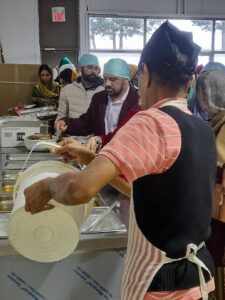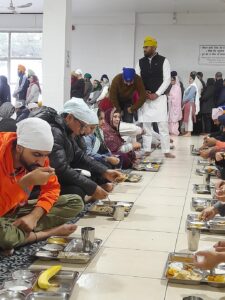Sounds of kirtans (spiritual songs) fill the halls as volunteers roll out hundreds of round flatbreads called rotis, traditionally made on large cast-iron griddles or tawas, for the growing numbers using langars – the communal kitchens run by Sikh communities in their places of worship and assembly called gurdwaras.
A diverse range of people, from international students and new immigrants to locals facing poverty and hunger, sit cross-legged on the floor and eat together in the langars, maintained by Sikh community volunteers doing seva (“selfless service”) and offering food free of charge, regardless of religion. Lacto-vegetarian meals and snacks are served seven days a week, sometimes from 4 a.m. to 9 p.m.
Much like food banks across the country, gurdwaras are experiencing a significant surge in users.
David Smith, who lives in Toronto and is on Ontario Disability Support Program funds of just under $850 a month, goes to a gurdwara for free cooked meals. He especially enjoys the desserts and the fact that there are few restrictions.
The signs posted on the walls inside encourage visitors to dress conservatively and modestly, avoiding clothing that is too revealing, including shorts and short skirts.
 Volunteers serve food in langars at the Toronto-based Sikh Spiritual Centre Rexdale, also known as Rexdale Gurdwara Sahib. Photo credit: Rubina Ahmed.
Volunteers serve food in langars at the Toronto-based Sikh Spiritual Centre Rexdale, also known as Rexdale Gurdwara Sahib. Photo credit: Rubina Ahmed.
“I need to ensure that I am sober,” says Smith, “not under the influence of drugs, and am dressed appropriately.”
Inderjit Singh, president of the Sri Guru Singh Sabha Toronto, says even in those cases, his volunteers try to help. He recalls that when a man arrived intoxicated, “we requested the individual not to enter the langar area and provided packed food for him.”
It is one of the oldest in Ontario and food has been served there since its inception to both worshippers and visitors. Drop-ins aren’t asked about their backgrounds, but Inderjit estimates that about one or two out of every 10 are either homeless or temporarily housed.
The Sikh temples are notably busier and more vibrant on weekends. Usually, food is served buffet style. Typical meals feature a combination of white rice and rotis, accompanied by lentils and one or two vegetable curries that have been bubbling in smoky kitchens. For those with a sweet tooth, rice pudding and custard are served for dessert, alongside Indian treats such as Gulab Jamun and jalebis.
In the heart of New Westminster, B.C., the Gurdwara Sahib Sukh Sagar serves meals to 1,000 people a week, including about 20 homeless people a day. Sardar Jagjit Singh, a committee member, says the langar has a partnership with the City of New Westminster through which it gets funding to provide 1,000 nourishing meals to the homeless as well as refugees in the downtown area.
In Montreal, Syrian refugee Fadel Hamdi says that he goes to two or three gurdwaras for free meals, including Gurdwara Guru Nanak Darbar in suburban LaSalle. Fadel says that he sees many non-Sikhs at the temples and that makes him feel welcomed.
Mukul Sangwan, an international student from the Indian state of Haryana, goes for meals to Gurdwara Guru Amardas Darbar Sikh Society in Kelowna. “Nobody asks me which community I come from. This place keeps me fed,” says Sangwan, who is searching for a part-time job. He says he both eats at the temple and is able to take food home to eat.
 People sit cross-legged and eat at a Toronto-based Sikh Spiritual Centre Rexdale, also known as Rexdale Gurdwara Sahib. Photo credit: Rumina Ahmed
People sit cross-legged and eat at a Toronto-based Sikh Spiritual Centre Rexdale, also known as Rexdale Gurdwara Sahib. Photo credit: Rumina Ahmed
Manjit S. Parmer, secretary of the Ontario Sikhs and Gurdwara Council (OSGC), a non-political body of Sikhs and gurdwaras, says there has been a 15 to 30 per cent increase in the number of people coming to langars for food since the beginning of the pandemic in 2020. He says that besides serving free meals, gurdwaras offer a range of community services, including assisting with immigration and employment-related matters, running Punjabi schools and providing funeral services.
A gurdwara that operates under the aegis of OSGC in Scarborough also delivers meals to seniors in downtown Toronto, adds Parmer.
Canada’s largest gurdwara, Ontario Khalsa Darbar (OKD) in Mississauga, commonly known as Dixie Gurdwara, reports a 25 per cent increase in the number of visitors over the past four years. It now serves meals to 10,000 people a week, with Saturdays alone drawing around 2,000 visitors, says Baljit Pandori, the chair of OKD. He says inflation, unemployment and housing affordability are among the reasons that more people are seeking help at gurdwaras.
Pandori says because the Dixie Gurdwara is far from downtown, it doesn’t get many walk-in visitors, but many people drop in on their way to work or back from work. Sometimes, he says, “individuals in need, such as refugees, can be seen sitting outside the premises. In these cases, we extend a warm invitation to them and ensure they are provided with food.”
The influx of visitors remains steady, unaffected by the killing of Hardeep Singh Nijjar on June 18 outside a Gurdwara in Surrey, B.C.,
All gurdwaras are funded by their members. In accordance with Sikhism, it is a practice to contribute 10 per cent of one’s earnings toward charitable causes. Several members also contribute non-perishable items such as rice, lentils and wheat flour as donations, says Pandori.
Major Singh, secretary of the Etobicoke-based Sikh Spiritual Centre, one of the Greater Toronto area’s largest gurdwaras, says: “Our resilience is fuelled by unwavering community support and a robust culture of volunteering.” Singh says about 3,500 people a week are fed at the centre’s langar, double the number of three years ago.
Aman Sethi, an international student from New Delhi who moved to Toronto this year to pursue a diploma in business management at Humber College, says his mother encourages him to visit the gurdwara when he feels lonely. “It’s a great gathering place. And I also like the servings in this place. The chawal and daal (rice and lentils), aachar (pickle) are truly delicious.”


The comments section is closed.